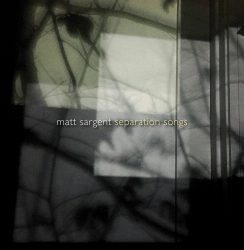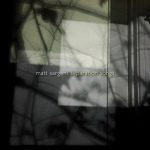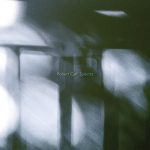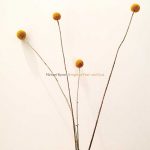Sometimes, when all music starts to sound the same, you may feel the need to listen to something ‘different’, ‘outside the box’, but at the same time ‘familiar’ in the ‘not-too-extreme’ sense. Something ‘surprising’.
Cold Blue Music might be the label to turn to to find some surprising music. With its unique focus on ‘West Coast minimalism and post-minimalism’ it offers a large selection of ‘new music’ by composers like Daniel Lentz, Peter Garland, Ingram Marshall, Harold Budd, Rick Cox, and – one of my favourites – Michael Fahres with Jon Hassell and Mark Atkins.
Here’s a short overview of three of their recent releases.
MATT SARGENT – SEPARATION SONGS 
Even with its slow evolving atmosphere and the soothing sound of a double string quartet, I found this 73-minute work quite disruptive. It sounds familiar but it isn’t.
New York composer Matt Sargent used a theme from a hymn tune from 18th-century composer William Billings to create this work, “subtly altering certain aspects of them via real-time-generated variations as the piece unfolds.”
“Throughout the piece, hymn tunes come and go, passing from one quartet to the other. As tunes reappear, they filter through a ‘separation process,’ whereby selected notes migrate from one quartet to the other. This process leaves breaks in the music that either remain silent or are filled in by stretching the durations of nearby notes, generating new rhythms and harmonies.”
On a certain level, it seems that theme fragments are repeated in endless variations, sometimes dissolving unnoticed, then resurfacing unexpectedly. It’s hard to distinguish the exact interaction between the two quartets, although it helps to listen on headphones.
And then there’s the length: 73 minutes is a long time, a véry long time. In fact, there was a moment when I thought the piece would probably be brought to an end – only to notice that I wasn’t even halfway.
“If something is boring after two minutes, try it for four. If still boring, then eight. Then sixteen. Then thirty-two. Eventually one discovers that it is not boring at all.”
John Cage
While listening, a comparison forced itself to the classic Brian Eno composition ‘Three Variations on the Canon in D Major by Johann Pachelbel’ (B-side of his 1975 release Discreet Music). Separation Songs has a similar effect on the listener. But there is a major difference: Eno unravels Pachelbel’s theme until it is completely unrecognizable and lets the listener doze away into a state of deep sleep. Sargent deconstructs Billings’ theme but constantly returns to recognizable fragments – re-involving the listener and not allowing him to ‘doze off’.
The original theme gets completely detached from its original and feels like it could probably last forever – if only the playing length of a CD wasn’t limited to about 73 minutes.
Separation Songs is performed by Eclipse Quartet playing both quartet parts interacting with itself via overdubbing.
MATT SARGENT – SEPARATION SONGS
(5 Minute Fragment)
Cold Blue Music releases are not strictly limited to full-length albums: a considerable part of their catalogue consists of (10-inch) EP-releases or CD-singles. “One-course musical meals” allowing composers to explore their ideas without having to bother about creating a full-length album.
ROBERT CARL – SPLECTRA 
Robert Carl‘s Splectra is a (2014) composition for harp solo ’embellished with subtle digital processing’.
‘Each of the work’s two movements/parts (one echoing the other in structure) gradually expands a simple rising motive, becoming harmonically richer by adding pitches related to its opening note’s (low C) harmonic series.’
The 15-minute composition is performed by harpist Alison Bjorkedal, with the overtones captured and sustained via a Max software patch designed and realized by Robert Carl and Matt Sargent.
The digital embellishments, however, are very subtle, perhaps even hardly noticeable unless you know what exactly to listen to. Splectra could’ve very well been a composition for solo harp.
The harp may be a somewhat underrated instrument in experimental music. I think it’s time for a revaluation of this instrument – and a work like this will definitely help. (Also check the recent release by Gwyneth Wentink and Pinkcourtesyphone for another great example.)
ROBERT CARL – SPLECTRA PART 2
MICHAEL BYRON – BRIDGES OF PEARL AND DUST 
Another example of Cold Blue Music’s CD-single series (‘one-course musical meals that are fully satisfying by themselves’) is Michael Byron‘s Bridges of Pearl And Dust. It is a single 15-minute composition for four vibraphones that ‘rings out with both inevitability and surprise as it moves through a series of beautiful harmonies.’
All four parts are performed by Ben Phelps. The complex (and seemingly random) pattern of notes feels like a refreshing summer rain. As Michael Byron writes about this composition: “With its tightly interwoven texture . . . Bridges of Pearl and Dust is a music about one thing: It points toward a musical experience in the present tense; the burden of anticipation is lifted, and drama, along with its potential for surprise, is abandoned.”
MICHAEL BYRON – BRIDGES OF PEARL AND DUST (fragment)






Hello Peter. I’m a new visitor to the website. I just finished reading the recommendations and they are very interesting. In particular the Michael Byron single captured my attention with the remark that it aims at lifting the burden of anticipation in music. I’m interested in listening to how he did that. Being a 45 yo new ambient music creator myself, I’m always eager to listen to music which opens new doors. The first and third recommendations seem to point in that direction. I’ll check them out at home.
Once again, thank you for taking the time to write this.
Have a nice day,
Roberto.
Thanks for your comment… I hope the music lives up to your expectation of ‘lifting the burden of anticipation’….
But it must be noted that this not exactly ‘ambient’ music: that’s why it is placed in the ‘other music’ category.